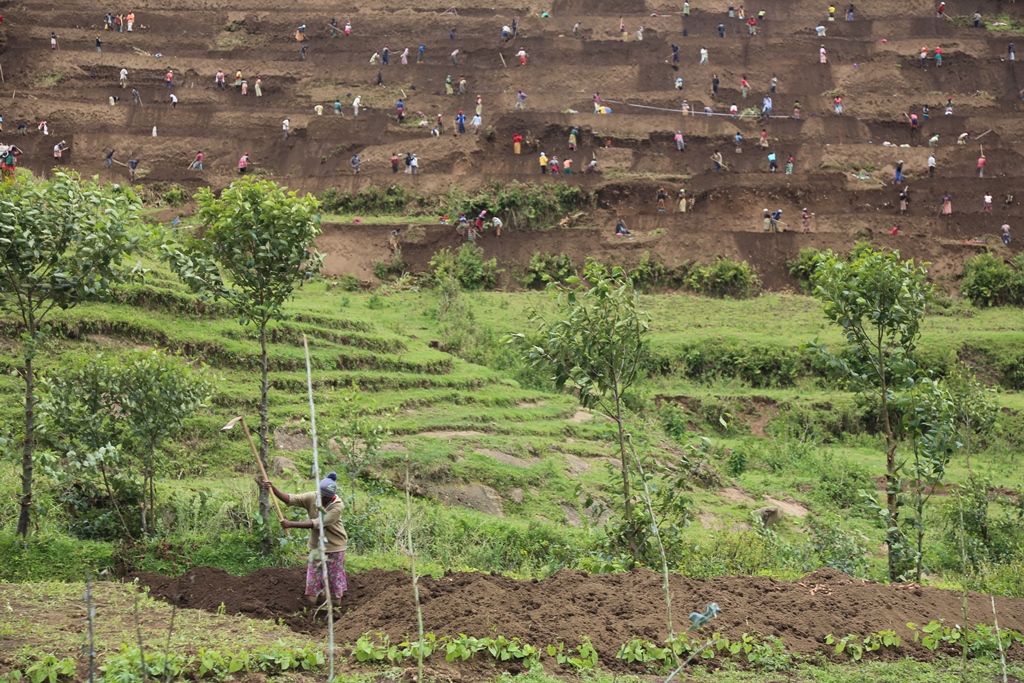Rwanda’s high population density combined with its reliance on rain-fed agriculture means that the predominantly rural population is increasingly farming smaller and smaller plots of land. The large number of people farming on Rwanda’s hilly and mountainous terrain has led to serious environmental degradation due to overexploitation of the soil and extensive erosion. The farmed Northern and Western uplands of Rwanda are considered the most vulnerable to erosion due to their steeper terrain and higher annual rainfall. In addition to these unsustainable farming practices, there has been significant unplanned settlement in fragile and sensitive areas. Recent changes in the variability of rainfall have had a dramatic effect on these already highly perturbed ecosystems particularly in the mountainous North West part of the country which has experienced floods and landslides.
Objectives: The objective of the project is to increase the adaptive capacity of natural systems and rural communities living in exposed areas of North Western Rwanda to climate change impacts. The strategy of the project is to manage the risks and effects from recurring floods, landslides and erosion through an integrated natural resource management and alternative livelihoods programme in one of the most climate sensitive and vulnerable areas of Rwanda. The project aims to address factors that exacerbate the effects of intense rainfall and lead to flooding and landslides. These include erosion and unsustainable farming practices linked to demographic pressure on natural resources. By introducing erosion and flood control measures, building the capacity of farmers to adapt to climate variability and supporting the development of off-farm livelihoods to reduce the pressure on natural resources, the project will restore the ecosystem functions necessary to reduce the incidence and severity of flooding and landslides on local communities and resources.
The anticipated impact of the project is the reduction of livelihood insecurity and losses from extreme climate events in 38,266 households located in the project area.
Learn more
- Article in New Times (January 19, 2018): Adaptation to Climate change project transforms lives of rural communities in Musanze and Nyabihu districts
- Watch a video: Adaptation Fund Rwanda Project in Action
| Project component 1: Adaptation to climate change (rainfall intensity and duration) through integrated land and water management to support climate-resilient production and post-harvest systems. | USD 4,580,694 |
| Project component 2: Support for the transition from unsustainable settlement patterns and exploitative farming practices to sustainable, diversified livelihoods. | USD 3,818,516 |
| Project component 3: Capacity building of local institutions to plan and implement climate resilient land and water management regimes and scale up effective adaptation strategies at the national and local levels | USD 209,890 |
| Project Execution Cost | USD 757,883 |
| Total Project Cost | USD 9,366,982 |
| Project Cycle Management Fee charged by the Implementing Entity | USD 602,637 |
| Grant Amount | USD 9,969,619 |
Project Documents
| Attachment | Type | Size |
|---|---|---|
| Project document | DOC | 4 MB |
| Project completion report | 2 MB | |
| Final evaluation report | 5 MB | |
| PPR1 (for web) | XLS | 296 KB |
| PPR2 (for web) | XLSX | 157 KB |
| PPR3 (for web) | XLSX | 161 KB |
| Other project order | 84 KB |


